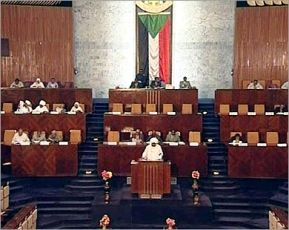Sudanese lawmakers pass disputed constitutional reforms
January 4, 2014 (KHARTOUM) – Sudanese lawmakers Sunday approved three controversial constitutional amendments introduced by the ruling National Congress Party (NCP) among the protests of opposition MPs who did not take part in the vote.

Initially, the parliament had been requested by the president to amend the constitution to enable him to appoint and relieve the state governors. The NCP, which controls 90% of the 450 parliamentary seats, two months ago, called to overhaul the decentralised governance, saying election of state governors encouraged the emergence of negative tribal and regional sentiments.
The two other reforms were not announced by government.
Also, the inclusion of the DDPD comes as Darfur rebel groups request to open the framework agreement for negotiations in a peace process mediated by the African Union High Level Implementation Panel (AUHIP).
The speaker of the National Assembly, al-Fatih Izz al-Deen said “the proposed constitutional amendments are conciliatory and ambulatory”.
However, the head of the Popular Congress Party (PCP) block, which composed of 8 legislators Ismail Hassan, slammed the move and announced they would boycott Sunday’s sessions
“We will not participate in the crime of amending the constitution,” Hassan further said on Saturday.
In a press conference held on Sunday to explain the PCP’s position on the reforms, Hassan accused the amendments committee of overstepping their initial attribution which was limited to the election of state governors.
He told reporters that the committee had committed a “sin”, adding they developed 18 constitutional amendments. He further criticised the approach of the panel saying they did not inform the people and its representatives about the reforms.
The PCP split form the ruling party in December 1999, following divisions over the election of governors by popular vote, a position supported by the then speaker of parliament Hassan al-Turabi and rejected by president Omer al-Bashir.
The two houses also endorsed the inclusion of the DDPD in the constitution, a step requested by former rebel groups that signed the text and the NCP to cut short any new demand from the rebel groups to discuss the framework agreement.
The deputy speaker of the upper house, the Council of States, Badawi al-Khair told the lawmakers before the vote that “the overall objectives of the DDPD are consistent with the general principles of the Interim Constitution (of 2005)”.
The secretary-general of the former rebel Liberation and Equality Movement (LJM) Bahr Idriss Abu Garda told the legislators that the DDPD has addressed the problems for which they took up arms and called for greater efforts to include the convince the holdout groups to joint it.
The adoption of this constitutional reforms comes four months before the general elections scheduled for next April.
It also intervenes, as the government calls for a national dialogue to end war in southern and western Sudan, and to discuss constitutional reforms.
(ST)
